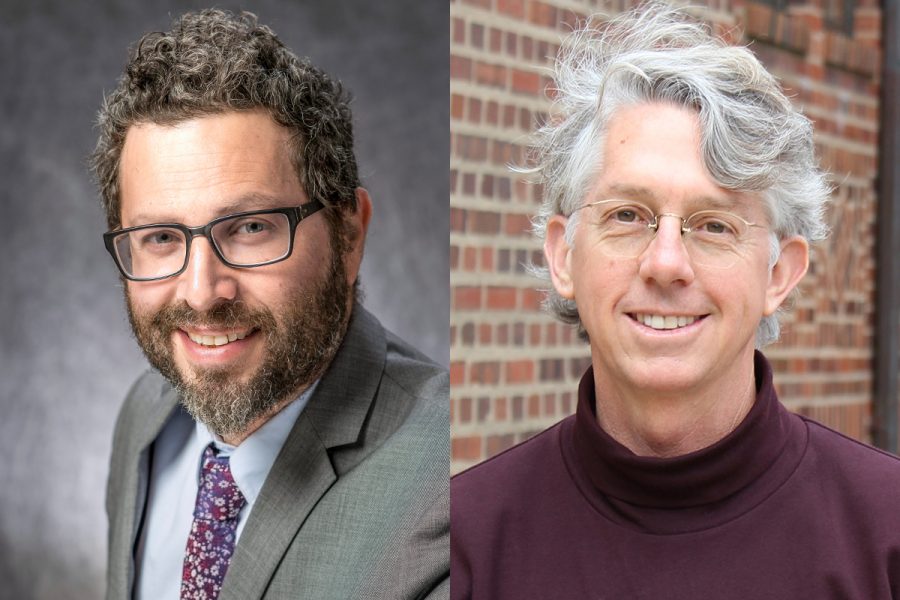University researchers awarded grants supporting digital innovation
Photo Courtesy of Darrell Hoemann / Syd Bauman
Gabriel Solis, professor in FAA, and Glen Worthey, associate director for HathiTrust Research Center, pose for headshots. The researchers received grants to help advance their efforts in digital jazz studies and artificial intelligence, respectively.
Apr 1, 2021
Researchers at the University were among the first recipients of the New Directions for Digital Scholarship in Cultural Institutions grants, which were bestowed to eight teams in total.
In an effort to facilitate and support global interactions between international researchers, the National Endowment for the Humanities and the United Kingdom’s Arts and Humanities Research Council established a joint grant program consisting of these grants.
According to the NEH and AHRC press release, the eight selective grants were announced in December and awarded with the intention of “developing new methods of sharing culture and heritage with global audiences, opening new research frontiers and advancing collections-based research methods for the 21st century.”
There was a particular emphasis on international collaboration, according to Gabriel Solis, professor in FAA and project director of the “New Directions in Digital Jazz Studies: Music Information Retrieval and AI Support for Jazz Scholarship in Digital Archives” project that received funding.
“This program was intended to produce collaboration — international collaboration,” Solis said. “So one of the goals was to get people and research teams working together across the Atlantic to do digital humanities work. That brings together resources in computer science and data science with scholars in the arts and humanities.”
Following the announcement in December and the submission of materials by applicants, a detailed and complex review process ensued, according to Glen Worthey, the associate director for research support services at HathiTrust Research Center and project director of the “AEOLIAN (Artificial intelligence for cultural organizations)” project that received funding.
After the NEH and AHRC offices independently reviewed the application materials and consulted with each other on the topic of finalists, a team of scholars was assembled to perform a detailed review.
“A set of usually four or five scholars related to the field but who aren’t applying for this particular grant are given the full application package,” Worthey said. “These scholars read them and then they get together for a full-day session to rank, discuss them and try to convince each other of each other’s rankings.”
Solis’ project, which received $149,031 and is composed of computer scientists, jazz historians, archivists and graduate students in both the U.S. and United Kingdom, is focused on developing and utilizing retrieval tools and artificial intelligence to assist with automatic transcription and analysis of jazz collections in archives.
“(The work involves) building these tools and starting to build on a kind of repository of recordings to start listening to with the help of a computer as a tool,” Solis said. “And this project takes those tools and puts them in archives and builds them into archive search functionality.”
An interesting component of this specific archival work involves the ability to study unique recordings beyond those that were commercially produced and circulated widely, such as bootleg recordings, demos and recordings taken during performances.
“That’s especially true for improvised music where audiences play such a big role and where the particular contexts of performance really can dramatically shape how long a piece is,” Solis said.
This particular project and the range of what was funded by this grant program excites Solis because it has the ability to reflect the diversity of life in both the United States and the United Kingdom.
“I think it’s really important that in this instance Black music, which Jazz is an African-American musical tradition at its root, is getting this kind of attention,” Solis said. “I think that’s really valuable and important that an array of kinds of things are being looked at.”
Worthey’s project, which received $49,820, is in collaboration with Loughborough University in the United Kingdom. It is focused on the possibilities of utilizing artificial intelligence to navigate closed digital archives that are not readily available to the public due to copyright and privacy. While people are restricted from accessing these archives, a computer algorithm would be able to enter and extract specific phrases to aid the researcher.
“So a human couldn’t necessarily read the entire contents of any particular email or of the whole set of emails, but the computer algorithm could go through and could extract certain topics from all those emails,” Worthey said.
The funding from the grant will be allocated toward creating six workshops and five case studies over the span of two years. Additionally, the team intends to publish various publications ranging from scholarly journal publications to a white paper.
The collaborative effort is being led by the HathiTrust Research Center, which is hosted jointly by the University’s School of Informaton Sciences and Luddy School of Informatics at Indiana University Bloomington. Other collaboration partners include Stanford University, Auburn University, the Frick Collection, the National Libraries of Scotland and Wales and the Wellcome Trust.
According to an email response from Worthey, the “three main objectives are: to make digital collections more accessible; to analyze these collections using innovative AI research methods; and to identify synergies and collaborative avenues between U.S. and U.K. cultural organizations.”






